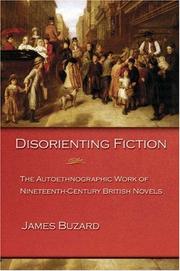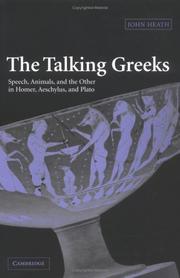| Listing 1 - 2 of 2 |
Sort by
|

ISBN: 0691095558 0691002320 9786612087820 9786612935398 1282935399 1282087827 1400826675 9781400826674 9780691002323 9780691095554 Year: 2005
Abstract | Keywords | Export | Availability | Bookmark
 Loading...
Loading...Choose an application
- Reference Manager
- EndNote
- RefWorks (Direct export to RefWorks)
This book gives an ambitious revisionist account of the nineteenth-century British novel and its role in the complex historical process that ultimately gave rise to modern anthropology's concept of culture and its accredited researcher, the Participant Observer. Buzard reads the great nineteenth-century novels of Charles Dickens, Charlotte Brontë, George Eliot, and others as "metropolitan autoethnographies" that began to exercise and test the ethnographic imagination decades in advance of formal modern ethnography--and that did so while focusing on Western European rather than on distant Oriental subjects. Disorienting Fiction shows how English Victorian novels appropriated and anglicized an autoethnographic mode of fiction developed early in the nineteenth century by the Irish authors of the National Tale and, most influentially, by Walter Scott. Buzard demonstrates that whereas the fiction of these non-English British subjects devoted itself to describing and defending (but also inventing) the cultural autonomy of peripheral regions, the English novels that followed them worked to imagine limited and mappable versions of English or British culture in reaction against the potential evacuation of cultural distinctiveness threatened by Britain's own commercial and imperial expansion. These latter novels attempted to forestall the self-incurred liabilities of a nation whose unprecedented reach and power tempted it to universalize and export its own customs, to treat them as simply equivalent to a globally applicable civilization. For many Victorian novelists, a nation facing the prospect of being able to go and to exercise its influence just about anywhere in the world also faced the danger of turning itself into a cultural nowhere. The complex autoethnographic work of nineteenth-century British novels was thus a labor to disorient or de-globalize British national imaginings, and novelists mobilized and freighted with new significance some basic elements of prose narrative in their efforts to write British culture into being. Sure to provoke debate, this book offers a commanding reassessment of a major moment in the history of British literature.
Alienation (Social psychology) in literature --- Aliénation (Psychologie sociale) dans la littérature --- Aliënatie (Sociale psychologie) in de literatuur --- Aliënatie [Sociale ] in de literatuur --- British national characteristics in literature --- Brits volkskarakter in de literatuur --- Britse volksaard in de literatuur --- Caractéristiques nationales britanniques dans la littérature --- Culture dans la littérature --- Culture in literature --- Cultuur in de literatuur --- Difference (Psychology) in literature --- Differentie (Psychologie) in de literatuur --- Différence (Psychologie) dans la littérature --- Ik in de literatuur --- Isolation sociale dans la littérature --- Marginalen in de literatuur --- Marginaux dans la littérature --- Moi dans la littérature --- National characteristics [British ] in literature --- Outsiders in literature --- Self in literature --- Sociaal isolement in de literatuur --- Social isolation in literature --- Sociale aliënatie in de literatuur --- Sociale vervreemding in de literatuur --- Vervreemding [Sociale ] in de literatuur --- Volksaard [Britse ] in de literatuur --- Volkskarakter [Brits ] in de literatuur --- 820 "18" --- Engelse literatuur--19e eeuw. Periode 1800-1899 --- 820 "18" Engelse literatuur--19e eeuw. Periode 1800-1899 --- Soi dans la littérature --- Zelf in de literatuur --- English fiction --- National characteristics, British, in literature. --- Alienation (Social psychology) in literature. --- Difference (Psychology) in literature. --- Social isolation in literature. --- Outsiders in literature. --- Culture in literature. --- Self in literature. --- History and criticism. --- National characteristics, British, in literature --- History and criticism --- 19th century --- Love in literature

ISBN: 0521832640 9780521832649 9780511483011 9780521117784 0511111134 9780511111136 0511111460 9780511111464 0511483015 1280415584 9781280415586 052111778X 1107139309 9781107139305 0511181329 9780511181320 0511197950 9780511197956 0511299060 9780511299063 Year: 2005 Publisher: Cambridge ; New York : Cambridge University Press,
Abstract | Keywords | Export | Availability | Bookmark
 Loading...
Loading...Choose an application
- Reference Manager
- EndNote
- RefWorks (Direct export to RefWorks)
When considering the question of what makes us human, the ancient Greeks provided numerous suggestions. This book argues that the defining criterion in the Hellenic world, however, was the most obvious one: speech. It explores how it was the capacity for authoritative speech which was held to separate humans from other animals, gods from humans, men from women, Greeks from non-Greeks, citizens from slaves, and the mundane from the heroic. John Heath illustrates how Homer's epics trace the development of immature young men into adults managing speech in entirely human ways and how in Aeschylus' Oresteia only human speech can disentangle man, beast, and god. Plato's Dialogues are shown to reveal the consequences of Socratically imposed silence. With its examination of the Greek focus on speech, animalization, and status, this book offers new readings of key texts and provides significant insights into the Greek approach to understanding our world.
Animals in literature --- Animals in poetry --- Animaux dans la littérature --- Animaux dans la poésie --- Beast epic --- Dieren in de literatuur --- Dieren in de poëzie --- Dierenepiek --- Dierenepos --- Dierenfabels --- Dierenromans --- Dierensprookjes --- Dierenverhalen --- Dieux grecs dans la littérature --- Difference (Psychology) in literature --- Differentie (Psychologie) in de literatuur --- Différence (Psychologie) dans la littérature --- Epopées animales --- Etres humains dans la littérature --- Fables ésopiques --- Goden [Griekse ] in de literatuur --- Gods [Greek ] in literature --- Human beings in literature --- Human-animal relationships in literature --- Language and languages in literature --- Langue et langues dans la littérature --- Man-animal relationship in literature --- Mens-dier relaties in de literatuur --- Mensen in de literatuur --- Parole (Linguistique) dans la littérature --- Relations homme-animal dans la litérature --- Speech in literature --- Spraak in de literatuur --- Taal en talen in de literatuur --- Greek literature --- Speech in literature. --- Human-animal relationships in literature. --- Difference (Psychology) in literature. --- Language and languages in literature. --- Gods, Greek, in literature. --- Human beings in literature. --- Animals in literature. --- Littérature grecque --- Parole dans la littérature --- Relations homme-animal dans la littérature --- Psychologie différentielle dans la littérature --- Langage et langues dans la littérature --- Homme dans la littérature --- History and criticism. --- Histoire et critique --- Aeschylus --- Homer --- Plato --- Littérature grecque --- Parole dans la littérature --- Relations homme-animal dans la littérature --- Psychologie différentielle dans la littérature --- Langage et langues dans la littérature --- Dieux grecs dans la littérature --- Homme dans la littérature --- Animaux dans la littérature --- Plato. --- Gods, Greek, in literature --- Man in literature --- History and criticism --- Aflāṭūn --- Aplaton --- Bolatu --- Platon, --- Platonas --- Platone --- Po-la-tʻu --- Pʻŭllatʻo --- Pʻŭllatʻon --- Pʻuratʻon --- Πλάτων --- אפלטון --- פלאטא --- פלאטאן --- פלאטו --- أفلاطون --- 柏拉圖 --- 플라톤 --- Homeros --- Homère --- Aischylos --- Eschilo --- Eschyle --- Eschylus --- Criticism and interpretation. --- Homerus --- Platon --- Platoon --- Criticism and interpretation --- Hóiméar --- Hūmīrūs --- Gomer --- Omir --- Omer --- Omero --- Ho-ma --- Homa --- Homérosz --- האמער --- הומירוס --- הומר --- הומרוס --- هومر --- هوميروس --- 荷马 --- Ὅμηρος --- Гамэр --- Hamėr --- Омир --- Homero --- 호메로스 --- Homerosŭ --- Homērs --- Homeras --- Хомер --- ホメーロス --- ホメロス --- Гомер --- Homeri --- Hema --- Pseudo-Homer --- Pseudo Omero --- Homer. --- Aeschylus. --- Платон --- プラトン --- Eskhil --- Esquilo --- Aiskhilos --- Eshil --- Æskílos --- Ajschylos --- Eschil --- Esḳilos --- Äschylos --- Eskili --- Aiszkhülosz --- Eschylos --- Iskilos --- Эсхил --- אייסכילוס --- איסכילאס --- איסכילוס --- إيسخولوس --- ايسخيلوس --- Αἰσχύλος --- Arts and Humanities --- History
| Listing 1 - 2 of 2 |
Sort by
|

 Search
Search Feedback
Feedback About UniCat
About UniCat  Help
Help News
News